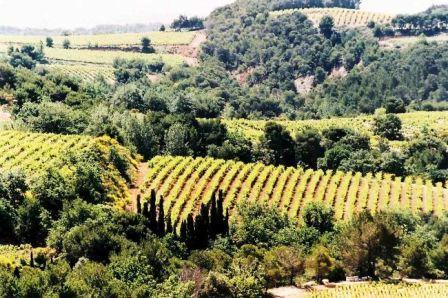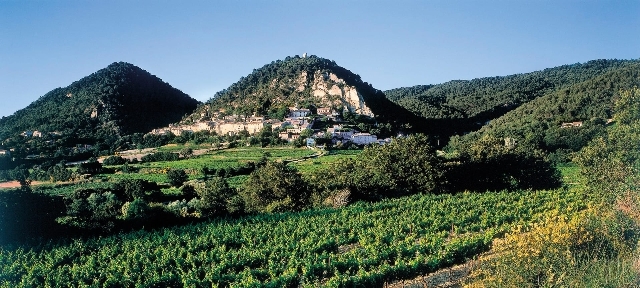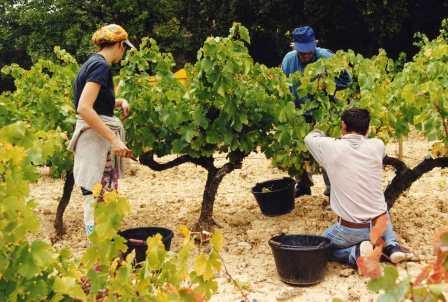organic wine, biodynamic wine, Demeter wine, na... Organic wine estates Clos du Joncuas
Clos du Joncuas

The Clos du Joncuas organic winery is owned and managed by the Chastan family
For many years Fernand Chastan took care of the vineyards and the vines and his daughter, as a soulful oenologist, took care of the winemaking. As her father got older, Dany also took over the organization and agronomic decisions in the vineyards, still happily taking her father's advice.
Photo left: Uschi Hartl, Dany Chastan
The history of the region of Seguret, Vacqueras and Gígondas over the last 170 years
Since the Greeks brought viticulture to southern France in the 7th century BC, winegrowers, farmers and farmers have repeatedly had to adapt to changing external conditions.
It was in the mid-19th century that phylloxera was brought to Europe along with American grape vines. It attacked the roots of European vines - the Americans were resistant to this root pest - and, with a few exceptions, brought viticulture in Europe to a standstill. This is also the case on the Rhône and in Provence.

Clos du Juncuas vineyard
Since the soil in the cleared vineyards was barren and not very fertile, but the temperatures were high in summer and there was hardly any rain, there were not many crops that were suitable as an alternative.
Some winegrowers decided to keep sheep or goats, others planted mulberry trees and raised silkworms. In the areas of Gigondas, Vacqueras and Seguret, olive cultivation was used. Although olive trees grow very slowly, the first small harvests and olive oil were produced after 10 years. This phase lasted until 1956, when an unusually severe cold period caused all the olive trees to freeze. Once again the fields were cleared, the olive wood was burned or used for handicrafts.
Clos du Juncuas, entrance to the winery
After all attempts to control phylloxera with chemicals had failed, it was gradually managed to stop it by grafting European grape varieties onto American rootstocks (which are resistant to phylloxera). It was the first biologically effective plant protection measure. Of course, this also brought the American fungi, downy mildew and oidium (powdery mildew) into European vineyards, which still cause great damage today and which are combated with a lot of chemicals in conventional viticulture.
At least it was now possible to grow wine professionally again. Fernand Chastan, the owner of Clos du Joncuas, replanted the region's typical grape varieties where his olive trees once stood, which still provide his daughters Dany and Carol with high-quality grapes today. From 1956 onwards, they were always cared for very carefully, you could even say with love, without the use of chemicals.
So if we talk about a winemaking tradition in the Clos du Joncuas, then it only began in 1956. It was Fernand Chastan who replanted vines on land in the Seguret, Vaqueras and Gigondes appellations that had long belonged to the family. There are three picturesque villages in the Vaucluse department that have received the same appellations for their wines over time.

Seguret (meaning security in Provençal) is one of the most beautiful villages in France
The Clos du Joncuas winery has vineyards in three appellations at the foot of the Dentelles de Montmirail limestone mountain range
Seguret AOC/AOP Côtes du Rhône Village, in 1967
Gigondas AOC/AOP on January 6, 1971, equated in quality with Châteauneuf du Pape
Vacqueras AOC/AOP on February 22, 1990, a top appellation, i.e. a cru that can be equated with Gigondas and Châteauneuf du Pape.
When it comes to organic viticulture, one cannot speak of tradition, although chemical pesticides and fertilizers were not available in either agriculture or viticulture before the Second World War. So until then, almost all wines were organic wines.
Organic wine only officially existed at the beginning of the 21st century. Provided that it was produced without the help of chemical pesticides and artificial fertilizers and that it was proven by a paid inspection of the winery and the person placing it on the market (organic certification).

Clos du Joncuas, grape harvest by hand
It is traditional at Clos du Joncuas to use the grape varieties Grenache, Mouvedre, Syrah and Cinsault for their organic wines, to harvest the grapes manually and to ferment and develop them spontaneously with the grapes' own yeasts in concrete tanks and in large wooden barrels.
Clos du Joncuas Vacqueras, AOC, La Font de Papier, red, organic wine, from € 20.50Product no.: 032320.95 € / bottle(s) *
1 l = 27.93 €
Delivery period 1-3 days |
Clos du Joncuas Seguret, AOC, La Garanciere, red, organic wine, from € 17.60Product no.: 032419.95 € / bottle(s) *
1 l = 26.60 €
Delivery period 1-3 days |
Clos du Joncuas Gigondas, AOC, red, organic wine, from € 26.20Product no.: 032526.60 € / bottle(s) *
1 l = 35.47 €
Delivery period 1-3 days |
Clos du Joncuas Gigondas, AOC, organic wine red, from € 29.40Product no.: 0325[1]29.80 € / bottle(s) *
1 l = 39.73 €
Delivery period 1-3 days |
![Biowein [pur] Hartl - organic wine shipper](/WebRoot/Store7/Shops/87b180e2-5584-4f7d-8168-acd5dfe63e0b/Styles/Sharp[3]/logo.png)







